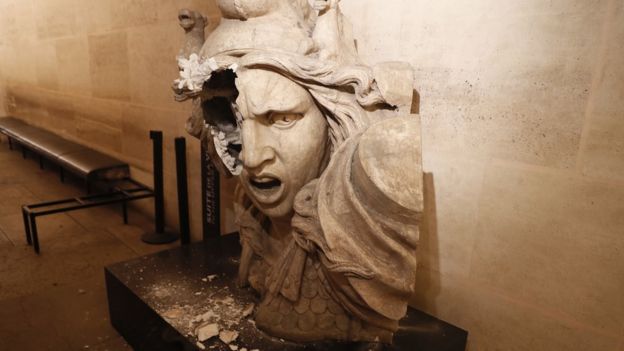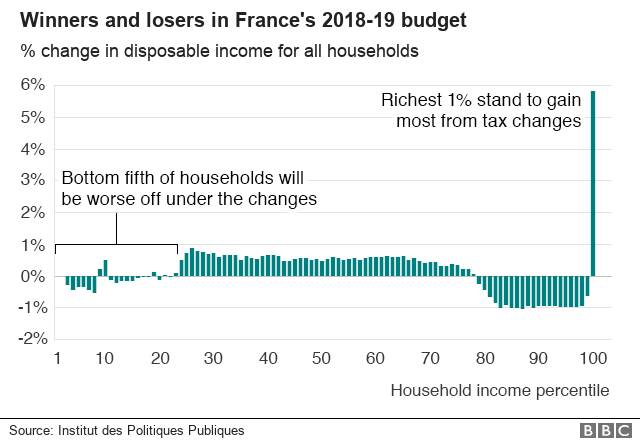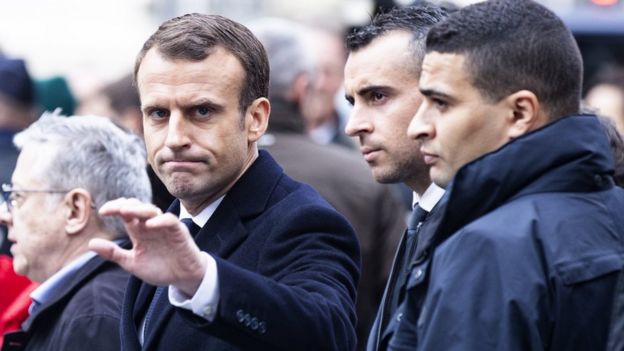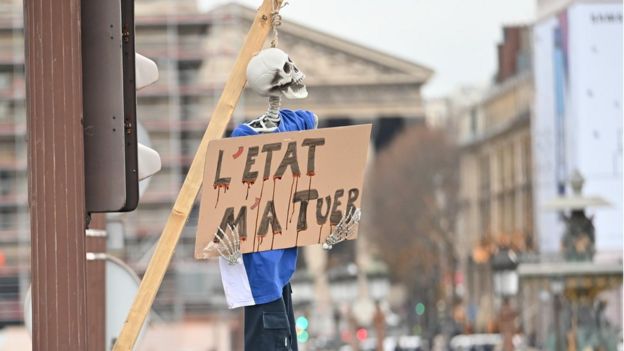Fuel tax rises which had led to weeks of violent protests in France have been suspended for six months.
PM Edouard Philippe said that people’s anger must be heard, and the measures would not be applied until there had been proper debate with those affected.
The protests have hit major French cities, causing considerable damage for the past three weekends.
The “gilets jaunes” (yellow vest) protests have now grown to reflect more widespread anger at the government.
Three people have died since the unrest began and the resulting violence and vandalism – notably when statues were smashed at the Arc de Triomphe in Paris last Saturday – have been widely condemned.
“Yellow vests” are so called because they have taken to the streets wearing the high-visibility yellow clothing that is required to be carried in every vehicle by French law.
The movement has grown via social media and has supporters across the political spectrum.
President Emmanuel Macron was elected last year with an overwhelming mandate for sweeping reform, but his popularity has fallen sharply in recent months.
Mr Macron has accused his political opponents of hijacking the movement in order to block the reforms.
What did Mr Philippe say?
Mr Philippe announced the measures in a TV address after meeting MPs from the governing party La Republique en Marche.
He said the six-month suspension would be applied to fuel tax increases, as well as to hikes in electricity and gas prices and strict vehicle emissions controls.
 Vandalism was rife during the protests in Paris
Vandalism was rife during the protests in Paris“The French people who have put on yellow vests love their country,” he said. “We share those values.”
But he said the violence must stop.
“The main role of the state is to guarantee public order, but we must fight against anything that endangers the unity of the nation,” he said, adding that any future demonstrations should be declared officially and carried out peacefully.
It is not clear how the government will find the revenue it was anticipating from these measures, but Finance Minister Bruno Le Maire – quoted by Reuters news agency – said the suspension would not put its budget commitments in jeopardy.
What is the wider anger about?
Emmanuel Macron was elected on a platform of economic reform which would, the French people were told, improve their lot – with lower unemployment and a kick-started economy.
But many feel that has not emerged. An analysis of the 2018-19 budget carried out by France’s public policy institute, for example, found that incomes for the poorest quarter of households would largely drop or stay the same under the plans.

Middle-income earners would see a modest bump – but the greatest beneficiaries would be those who were already wealthy, in the top 1%. The pattern is worse for retired people – almost all of whom will be worse off.
 Mr Macron (L) had vowed not to capitulate to street protests
Mr Macron (L) had vowed not to capitulate to street protestsMacron’s difficulty
Will it be enough? That is the first question. Will the yellow vests feel they have won a big enough concession from the government, and therefore call off their protest?
There are plenty of voices that can be heard today saying they want more. Why is it only a suspension of the tax rise, they ask, and not an abolition? What is to guarantee that the government won’t reinstate it next June? Maybe we need to step up the pressure.
But by making a concession, the government does not need to satisfy everyone. It needs only to satisfy a large enough bloc of “moderates” among the gilets jaunes, and wean them away from the barricades.
If that happens, then the movement will lose momentum. And though it won’t be over, the end will be in sight.
My bet would be that this will be what happens. Opinion polls will show a general approval of the government’s concession. The gilets jaunes en masse start to waver. But there’s still a protest by hardliners on Saturday.
Maybe a parting shot, but still – and maybe because of that – a dangerous moment.
How has the news been received?
Yellow vest spokesman Benjamin Cauchy said the move was “either a disguised political snub or… to make fun of the French and put the tax back in six months”.
Bruno Retailleau, the Senate leader of the centre-right opposition, the Republicans, said the suspension was “absolutely inadequate”.
Far-right leader Marine Le Pen concurred, tweeting (in French) that a postponement, rather than cancellation, of the tax did not go far enough.
Ségolène Royal, former ecology minister for the centre-left Socialists, welcomed the move but said the tax should have been put on hold from the beginning.
Fears that violent protests in the capital could continue next weekend have led Paris St Germain to postpone their League 1 home football match on Saturday.
Who are the protesters?
The “gilets jaunes” movement began as a protest against a rise in duties on diesel, which is widely used by French motorists and has long been less heavily taxed than other types of fuel.
Mr Macron says his motivation for the increase is environmental, but protesters say he is out of touch, particularly with non-city dwellers who rely on their cars.
 Changes affecting ambulance drivers are part of a raft of reforms by President Macron
Changes affecting ambulance drivers are part of a raft of reforms by President MacronThe movement has grown to reflect a range of grievances, including the marginalisation of rural areas, high living costs, and general anger at President Macron’s economic policies.
The protests have no identifiable leadership and gained momentum via social media, encompassing a range of participants from the anarchist far left to the nationalist far right, and plenty of moderates in between.
Nearly 300,000 people took part in the first countrywide demonstration. There were more than 106,000 a week later, and 136,000 people last Saturday.
What were the changes that caused this anger?
The price of diesel, the most commonly used fuel in French cars, has risen by about 23% over the past 12 months to an average of €1.51 (£1.32; $1.71) per litre, its highest point since the early 2000s.
World oil prices did rise before falling back again, but the Macron government raised its hydrocarbon tax this year by 7.6 euro cents per litre on diesel and 3.9 cents on petrol.
Mr Macron has blamed world oil prices for three-quarters of the price rise, but said higher taxes on fossil fuels were needed to fund renewable energy investments.
The decision to impose a further increase of 6.5 cents on diesel and 2.9 cents on petrol on 1 January 2019 was seen as the final straw for the protesters.
By Hugh Schofield, BBC News, Paris
